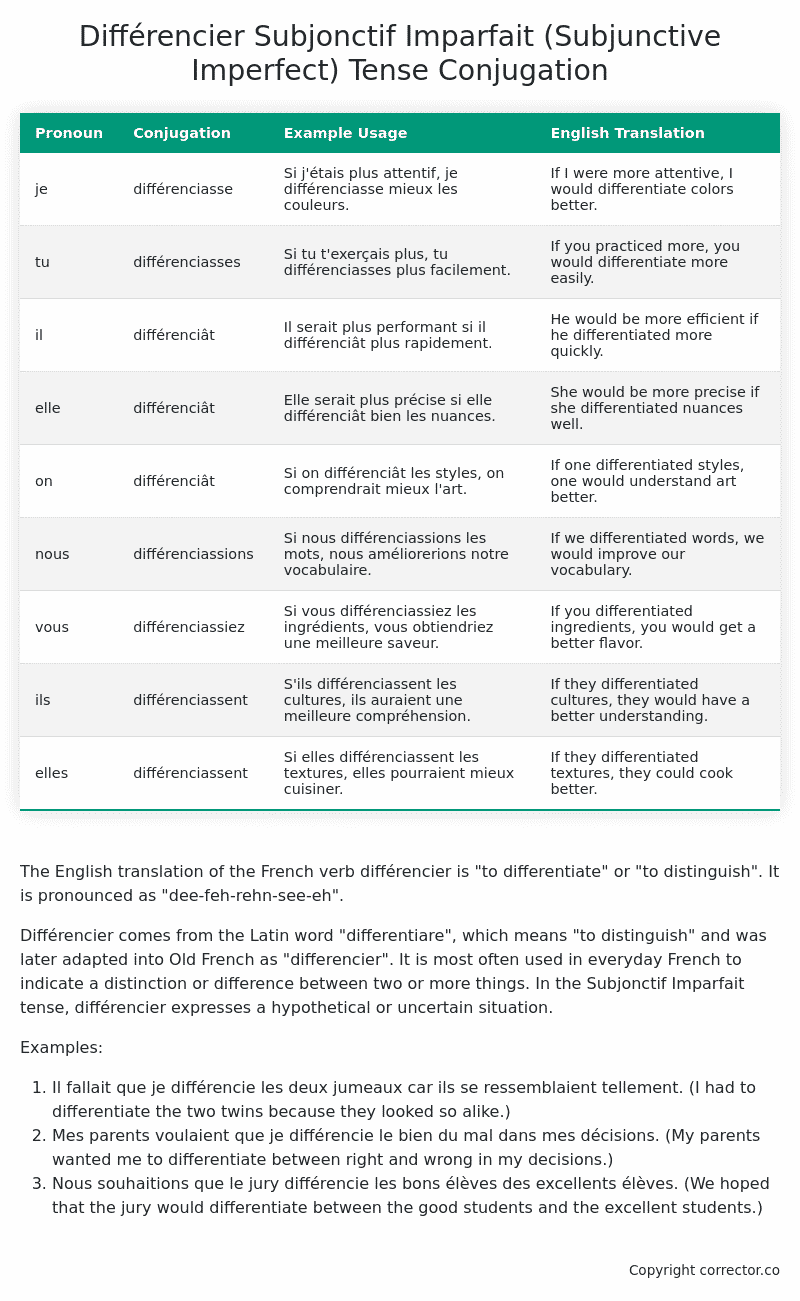Subjonctif Imparfait (Subjunctive Imperfect) Tense Conjugation of the French Verb différencier
Introduction to the verb différencier
The English translation of the French verb différencier is “to differentiate” or “to distinguish”. It is pronounced as “dee-feh-rehn-see-eh”.
Différencier comes from the Latin word “differentiare”, which means “to distinguish” and was later adapted into Old French as “differencier”. It is most often used in everyday French to indicate a distinction or difference between two or more things. In the Subjonctif Imparfait tense, différencier expresses a hypothetical or uncertain situation.
Examples:
- Il fallait que je différencie les deux jumeaux car ils se ressemblaient tellement. (I had to differentiate the two twins because they looked so alike.)
- Mes parents voulaient que je différencie le bien du mal dans mes décisions. (My parents wanted me to differentiate between right and wrong in my decisions.)
- Nous souhaitions que le jury différencie les bons élèves des excellents élèves. (We hoped that the jury would differentiate between the good students and the excellent students.)
Table of the Subjonctif Imparfait (Subjunctive Imperfect) Tense Conjugation of différencier
| Pronoun | Conjugation | Example Usage | English Translation |
|---|---|---|---|
| je | différenciasse | Si j’étais plus attentif, je différenciasse mieux les couleurs. | If I were more attentive, I would differentiate colors better. |
| tu | différenciasses | Si tu t’exerçais plus, tu différenciasses plus facilement. | If you practiced more, you would differentiate more easily. |
| il | différenciât | Il serait plus performant si il différenciât plus rapidement. | He would be more efficient if he differentiated more quickly. |
| elle | différenciât | Elle serait plus précise si elle différenciât bien les nuances. | She would be more precise if she differentiated nuances well. |
| on | différenciât | Si on différenciât les styles, on comprendrait mieux l’art. | If one differentiated styles, one would understand art better. |
| nous | différenciassions | Si nous différenciassions les mots, nous améliorerions notre vocabulaire. | If we differentiated words, we would improve our vocabulary. |
| vous | différenciassiez | Si vous différenciassiez les ingrédients, vous obtiendriez une meilleure saveur. | If you differentiated ingredients, you would get a better flavor. |
| ils | différenciassent | S’ils différenciassent les cultures, ils auraient une meilleure compréhension. | If they differentiated cultures, they would have a better understanding. |
| elles | différenciassent | Si elles différenciassent les textures, elles pourraient mieux cuisiner. | If they differentiated textures, they could cook better. |
Other Conjugations for Différencier.
Le Present (Present Tense) Conjugation of the French Verb différencier
Imparfait (Imperfect) Tense Conjugation of the French Verb différencier
Passé Simple (Simple Past) Tense Conjugation of the French Verb différencier
Passé Composé (Present Perfect) Tense Conjugation of the French Verb différencier
Futur Simple (Simple Future) Tense Conjugation of the French Verb différencier
Futur Proche (Near Future) Tense Conjugation of the French Verb différencier
Plus-que-parfait (Pluperfect) Tense Conjugation of the French Verb différencier
Passé Antérieur (Past Anterior) Tense Conjugation of the French Verb différencier
Futur Antérieur (Future Anterior) Tense Conjugation of the French Verb différencier
Subjonctif Présent (Subjunctive Present) Tense Conjugation of the French Verb différencier
Subjonctif Passé (Subjunctive Past) Tense Conjugation of the French Verb différencier
Subjonctif Imparfait (Subjunctive Imperfect) Tense Conjugation of the French Verb différencier (this article)
Conditionnel Présent (Conditional Present) Tense Conjugation of the French Verb différencier
Conditionnel Passé (Conditional Past) Tense Conjugation of the French Verb différencier
L’impératif Présent (Imperative Present) Tense Conjugation of the French Verb différencier
L’infinitif Présent (Infinitive Present) Tense Conjugation of the French Verb différencier
Struggling with French verbs or the language in general? Why not use our free French Grammar Checker – no registration required!
Get a FREE Download Study Sheet of this Conjugation 🔥
Simply right click the image below, click “save image” and get your free reference for the différencier Subjonctif Imparfait tense conjugation!

Différencier – About the French Subjonctif Imparfait (Subjunctive Imperfect) Tense
Formation
Common Everyday Usage Patterns
Interactions with Other Tenses
Subjonctif Présent
Indicatif Passé Composé
Conditional
Conditional Perfect
Summary
I hope you enjoyed this article on the verb différencier. Still in a learning mood? Check out another TOTALLY random French verb conjugation!


